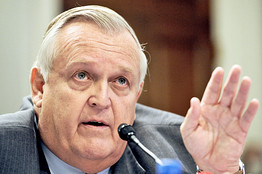By NEIL KING JR.
WASHINGTON -- Just hours after President Barack Obama made him the top watchdog over the $787 billion stimulus package, Earl Devaney pulled a calculator from his desk at the Interior Department and did some simple math.
Fraud typically gobbles up around 7% of all big contracts. Mr. Devaney punched in the numbers. "Wow, $55.1 billion," he recalled thinking. "That's a lot of money."
A hard-nosed Interior Department inspector general who helped lock up the agency's No. 2 official along with the lobbyist Jack Abramoff, Mr. Devaney now has one of the most delicate jobs in Washington.
As head of the administration's new Recovery Act Accountability and Transparency Board -- already dubbed the Rat Board -- he must ensure that the spending proceeds smoothly and relatively fraud-free. But any success he has in sniffing out malfeasance could be politically damaging to Mr. Obama, providing fodder for conservatives who say the package is ripe for abuse.
Mr. Devaney's role highlights the gamble Mr. Obama is waging as he rolls out the biggest government-spending program in generations. The president wants to disburse vast sums with unprecedented speed. But to maintain political support, he wants to impose a level of scrutiny over the spending far beyond anything the government has ever pulled off.
State watchdogs are already sending up alarms that the two goals -- speed and accountability -- may be tough to mesh. "This is the biggest influx in money that we've ever seen," said Kinney Poynter, who directs the National Association of State Auditors, Comptrollers and Treasurers. "We want to comply with the wishes of the president and the governors, but we don't want to see this money wasted."
Mr. Devaney, 61 years old, will be the most prominent of a small army of federal and state watchdogs now scrambling to keep tabs on stimulus spending. The bill sets aside $350 million for oversight.
But the hurdles are significant. With stimulus money already moving out to the states, Mr. Devaney still has no office for his tiny staff. His board, overseen by Vice President Joe Biden, will consist largely of other agency inspectors general, but its exact makeup remains unresolved.
"This job is way up there in terms of difficulty and lack of infrastructure," said Mr. Devaney, who led the Secret Service's antifraud unit and chased criminal polluters at the Environmental Protection Agency before starting his Interior Department stint in 1999. "There's no organization. There's no job description. All of that has to be built."
The administration is promising to post stimulus spending all the way down to the municipal level, in near real time, on a new government Web site, www.recovery.gov. But state and local budget officials warn that they are not yet prepared to comply, and that some of the data being requested, such as the number of jobs created or saved, may be difficult to nail down. Mr. Obama has promised that the package will save or create at least 3.5 million jobs.
"Jobs are just not a piece of data that we now capture, so making that a part of our accounting will be a challenge," said Martin Benison, the comptroller for Massachusetts.
Neil Barofsky, the special inspector general for the $700 billion Troubled Asset Relief Program, acknowledges the trade-off between strict policing and getting much-needed money out the door, saying in an interview that it is impossible to eliminate all waste and fraud from big government programs.
Mr. Devaney said that if he can tighten oversight agency by agency as the money is spent, then "we have a good chance" of assuring fraud and waste "falls well below" normal levels.
Mr. Devaney's reputation as a tough enforcer goes back decades. He led a campaign against computer and cellphone hackers at the Secret Service. He then ramped up a dormant criminal-enforcement division at the EPA, filing a record 410 criminal cases in his first year.
His biggest splash, though, came during his Interior years. Mr. Devaney's probe into Indian-casino gambling helped set in motion the Abramoff investigation, leading to the conviction of former Deputy Interior Secretary J. Steven Giles. Mr. Devaney in 2006 told a House panel looking into agency abuses that "short of a crime, anything goes at the highest levels of the Department of the Interior." Last fall, he issued a scathing report on misconduct in the agency that handles oil and gas contracts on public lands.
The question now is whether Mr. Devaney will end up causing similar heartburn within the White House. Mr. Devaney said he will do whatever is necessary.
"I'm not going to change my personal way of doing business," he said, cracking a rare smile. "I certainly hope this doesn't result in any animosity. But they knew what they were getting."
Write to Neil King Jr. at neil.king@wsj.com
Printed in The Wall Street Journal, page A4






![[gascover1]](https://cybercemetery.unt.edu/archive/cop/20110402233235im_/http://si.wsj.net/public/resources/images/OB-NI994_gascov_C_20110401184323.jpg)
![[Car1]](https://cybercemetery.unt.edu/archive/cop/20110402233235im_/http://si.wsj.net/public/resources/images/OD-AF476_Car1_C_20110401011028.jpg)
![[OB-NJ130_gomez1_C_20110402143726.jpg]](https://cybercemetery.unt.edu/archive/cop/20110402233235im_/http://si.wsj.net/public/resources/images/OB-NJ130_gomez1_C_20110402143726.jpg)
![[COBRA]](https://cybercemetery.unt.edu/archive/cop/20110402233235im_/http://si.wsj.net/public/resources/images/NY-AW294_COBRA_C_20110401222208.jpg)
![[jumpropes1]](https://cybercemetery.unt.edu/archive/cop/20110402233235im_/http://si.wsj.net/public/resources/images/OB-NI754_jumpro_C_20110401123242.jpg)
![[NYSCENE6]](https://cybercemetery.unt.edu/archive/cop/20110402233235im_/http://si.wsj.net/public/resources/images/NY-AW330_NYSCEN_C_20110401181946.jpg)





Most Recommended
“"[Working class whites]...;”
“The plan of the left, as so...;”
“A model for the failure of...;”
“One congressman bucking the...;”
“Exactly like the Mafia, unions...;”